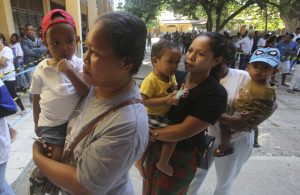A parliamentary election and the climax of a month of celebrations marking the anniversary of independence came and went last weekend in Asia’s youngest nation, Timor-Leste. By Tuesday, May 23, the results were in: Xanana Gusmao’s National Congress of the Reconstruction of East Timor (CNRT) won from opposition, taking 31 out of a possible 65 seats in parliament. Although short of a 33-seat outright majority, it was a clear win for CNRT.
Sometimes it really is a matter of reading the writing on the wall. And walking along the main esplanade in the capital Dili, just adjacent to the Palace of Government, I saw the words “viva Xanana” boldly scrawled across the wall. Although likely written many years ago, the message is just as relevant today. Xanana Gusmao, 76, the national hero who led the country to independence in 2002, is very much alive – and now eyeing the prime ministership once again.
With the election coinciding with the celebrations of the 21st anniversary of independence, it has been quite an exciting time in Timor-Leste. The country’s red, black, yellow, and white starred flags have been lining the streets. And there has been a month-long night market in Dili with bands and DJs playing every night. The food is delicious, and the atmosphere is electric.
Before voting started, I spoke with three young university students energized by the election and confident about what it would produce. “The right leader will come, and the transformation will also come and everyone will be happy and live free,” one told me. His friend added, “we know that someone [who we vote for] will bring the prosperity, he will bring the peace. And help a lot of Timorese people that now are suffering.”
But they had their worries too. They cautioned that many politicians like to talk and promise whatever will get them elected, without a plan to deliver.
As with the presidential election that brought Jose Ramos-Horta back to the Presidential Palace last year, Timorese politics is increasingly having to accommodate the interests of young people, with some 62 percent of the population being under 25.
Not everyone shares the excitement about the election. On a local bus heading out of the city, the campaign seemed far away. A woman carrying her shopping back from town was less than impressed with the election season and the current politicians.
Two days before the election, I met Joela, who everyone calls “Titi,” a 24-year-old from Dili, one of nine siblings and working any job she can get. She is transgender, and when I asked her if she had hopes for the election, she quickly shook her head, “no, no,” without a second thought.
For Titi, the election and all the flag-waving might as well have been in another country. She told me that the government hadn’t done much to support Timor-Leste’s LGBTQ community. Being transgender in Timor-Leste is a struggle against daily and deeply held prejudice and discrimination. She knows the troubles her community faces. And although she has allies, it seems the government is not one of them.

































